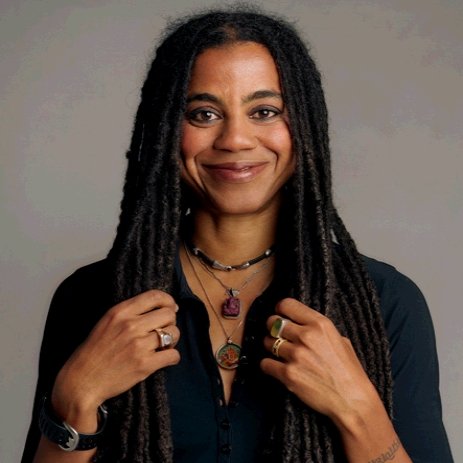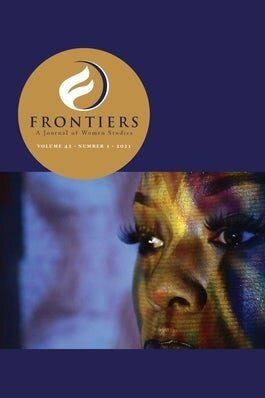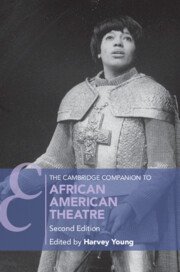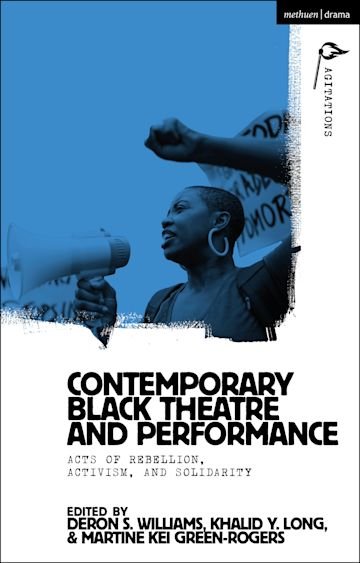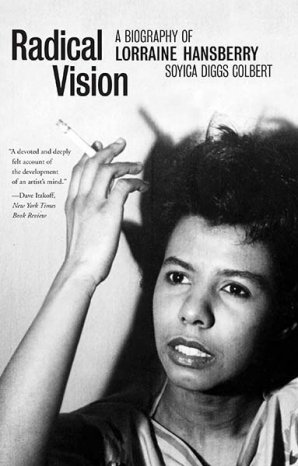Research
Peer-Reviewed Articles
“Seen/Scene: Suzan-Lori Parks’ Manifesto for Black People Onstage Revisited.” Theatre History Studies. Spec. issue Manifestos in Black Theatre (Vol. 43 Issue 1). (Forthcoming)
Abstract: Originally conceived by playwright Suzan-Lori Parks, Watch Me Work debuted at The Public Theater in 2012. Parks describes the project simultaneously as an interactive “meditation on the artistic process” and as a working session for herself and the spectators. The actual performance of Watch Me Work is rather unremarkable. Parks introduces the piece by explaining what it is and how it will unfold: it will include both action and dialogue, beginning with a writing session (the action), and then followed by the dialogue, a “Question & Answer” session in which the audience can ask Parks direct questions about her writing process and about their own writing. Parks’s meta-theatrical performance animates this essay’s central contentions about and explorations of the role of the Black body in live performance and what placing Black people on stage to be looked at and gazed upon means in a long legacy of Black exhibition. I am interested in how these legacies permeate our current Black theatre landscape and how returning to Parks’s earlier manifestos creates opportunities to consider how Black theatre negotiates the questions she posed in “An Equation for Black People Onstage”: “[W]hat is theatre good for? What can theatre do for [Black people]?” To consider these questions and illustrate Parks’s answers to them, this essay provides a dramaturgical analysis of Parks’s Venus, which I contend stages the obstacles and pitfalls of being a subject that exists within the dialectic paradigms of invisibility and hypervisibility, conceiving a space for Black life to exist within and outside of this binary. In so doing, this article explores how Parks not only utilizes Watch Me Work to wrestle with her own embodiment and celebrity, but also to grapples with embodiment in relation to other Black artists, performers, and playwrights—real and imagined.
“Lorraine Hansberry and the Praxis of Freedom.” AAIHS, September 7, 2022. https://www.aaihs.org/lorraine-hansberry-and-the-praxis-of-freedom/
Abstract: A roundtable discussion on Soyica Diggs Colbert’s Radical Vision. How does one sharpen our focus on the multiplicity and dimension of Lorraine Hansberry’s public and private life without flattening it as many critics have done before? The life of Hansberry does not end and begins with A Raisin in the Sun. Expanding the legacy and understanding of such a luminous figure as Hansberry is a difficult task to undertake. Soyica Diggs Colbert’s Radical Vision: A Biography of Lorraine Hansberry masterfully achieves this task.
“‘Who Lives, Who Dies, Who Tells [Her] Story”: An Intersectional Analysis of the Women of Hamilton.” The Journal of American Drama and Theatre 34.1 (Fall 2021).
Abstract: On the one hand, when the women performers of Hamilton have been examined in popular publications, they are celebrated because they acknowledge the presence of women in the historical record. On the other hand, academic research has been much more critical of the musical’s inclusion of women, with many scholars interrogating what they see as its hollow feminist politics. Both critics and scholars alike tend to overlook the way that race structures how these women’s bodies are read on stage and within the musical libretto, suggesting a universalization of gender that ignores the intersection of race. While I am encouraged by and appreciate the attention to the women of Hamilton, apparently the possibility that women of color spectators of the musical construct alternative meanings from the performances of Phillipa Soo, Renée Elise Goldsberry, and Jasmine Cephas-Jones is not considered viable. In this article I complicate previous studies of the musical’s treatment of race and gender, arguing that the actresses’ embodiment in Hamilton disrupts normative, white gender constructions while highlighting the labor of women of color in musical theatre.
“‘Posin’ a Threat’: Countering the Colonial Project from Jay-Z’s “Moonlight” to the House of Representatives.” Frontiers: A Journal of Women's Studies. Spec. issue African American Performance: Feminist and Queer Perspectives (Vol. 42 Issue 1, 2021), 141-160.
Abstract: Jay-Z’s “Moonlight” critiques the ability for Black cultural production and art to thrive and be celebrated within parameters controlled and mediated by white gatekeepers. Adding another layer to this commentary, the “Moonlight” video parodies the popular television show Friends by restaging a particular Friends episode with recognizable Black actors. Adopting Frantz Fanon’s framework of decolonization, this demonstrates how performance has been a site for Black artists to reconfigure stereotypical images and champion embodied experiences of blackness as a way of knowing. Thus, by engaging with issues raised by performance and media studies, this article asks: how does contemporary performance by Black subjects illuminate the gaps and erasure that occur in the public sphere (i.e. popular culture) and help activate a process of decolonization? Moreover, with a continued concentration on the Moonlight video, this article also interrogates intra-racial tensions by rigorously addressing the issue of gender. While I argue that the music video for “Moonlight” gifts audiences with a performance that interrogates, disrupts, and reconfigures dominant narratives of the colonized by the colonizers, I also contend that it reveals the necessary recognition that gender plays a vital role in the ability to enter into a true and wholistic process of decolonization.
Book Chapters
“Black Queer Drama.” In The Cambridge Companion to African American Theatre, Second Edition, ed. Harvey Young. (2023).
Abstract: In this chapter, I focus on the work of four contemporary Black playwrights: Tarell Alvin McCraney’s Choir Boy (2012), Robert O’Hara’s Bootycandy (2014), Aziza Barnes’ BLKS (2017), and Christina Anderson’s How to Catch Creation (2019). This chapter takes up these playwrights’ theatrical oeuvres, paying particular attention to how they stage the complexities, depth, and breadth of Black queer life. Each drama this chapter discusses features LGBT+ characters that negotiate and navigate what it means to live at the intersections of blackness and queerness. In the dramas discussed, these playwrights stage the practices Black queer people adopt to survive, build community, and construct alternative possibilities for themselves among the violence they often face even by other Black people. Taken together, these playwrights and their subsequent plays, yell from the rafters that contemporary Black theatre is here, and indeed, very queer.
“Grunt Work: Serena Williams’s Black Sound Acts as Rebellion.” In Acts of Rebellion, Activism, and Solidarity in Contemporary Black Theatre and Performance, eds. Khalid Yaya Long, Martine Kei Green-Rogers, and DeRon Williams. Bloomsbury Press.
Abstract: Taking inspiration from the litany of aforementioned Black feminist sound scholars, it is through the framework of Black feminist sound in which I orient my analysis of Serena Williams, reading the ways that sound becomes a Black feminist strategy by which Serena (re)claims her own body and voice on the tennis court. For Serena, her grunt becomes one way for her to invest in her own epistemologies—epistemologies that, in turn, do not require the acceptance nor recognition of whiteness. Serena’s aural responses serve as a refusal of whiteness’ goal to police and discipline her body into submission. In this way, Serena can be placed into a genealogy of black sonic ruptures in the face of objectification and subjugation.
“Surviving Against a Sharp White [Tennis] Background in Terrence McNally's Deuce and Claudia Rankine's Citizen.” In Sports and Plays. Routledge, Taylor & Francis Group, eds. Broderick Chow and Eero Laine.
Abstract: Operating from the premise that theatre and performance can yield valuable insights into the operations of race and gender in sports, this essay examines Terrence McNally’s Deuce (2007) and Claudia Rankine’s Citizen: An American Lyric (adapted for the stage by Stephen Sachs, 2015). The critical questions that activate this essay are: How do these dramas re-inscribe or challenge who is allowed to enter, lay claim, and reconfigure the athletic landscape? More broadly, how may Rankine and McNally’s plays offer the opportunity to interrogate how the racialized and gendered body shape sports? In service of these questions, I argue that McNally and Rankine leverage the centrality of the body in both performance and sports to interrogate the representational politics of sports. In doing so, these playwrights address the ways that women athletes must contend with their marginalization and—through both the absence and presence of racial tropes—reveal how Black women athletes are scripted into, and outside of, narratives of womanhood.
Book & Performance Review
“Book Review of Radical Vision: A Biography of Lorraine Hansberry.” by Soyica Diggs Colbert. Theatre History Studies (Forthcoming)
A review of Soyica Diggs Colbert's Radical Vision: A Biography of Lorraine Hansberry.
“Performance Review of Gem of the Ocean.” by August Wilson. August Wilson Journal vol. 1.1 (2019)
A review of August Wilson's Gem of the Ocean, staged at the Round House Theatre in Bethesda, Maryland, from November 28-December 30, 2018.
